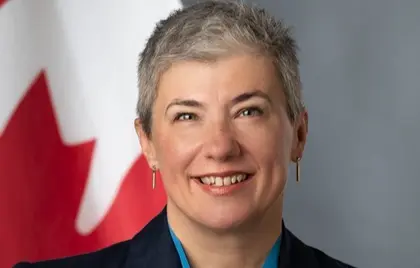Global Affairs Canada, Ottawa’s foreign-affairs ministry, has announced that Natalka Cmoc was appointed to the role of Ambassador in the middle of August. Ms Cmoc has held a series of federal posts, that involved working with Ukraine, since the 1990s. As part of its announcement the ministry noted that Canada became the first Western country to recognize Ukraine’s independence on Dec. 2, 1991.
Cmoc, who studied anthropology in Toronto, carried out field research in Ukraine and Russia in the 1990s, which included the implementation of Canadian technical assistance projects in Ukraine. She later served at the Kyiv embassy between 2011 and 2013 before returning to Ottawa.
JOIN US ON TELEGRAM
Follow our coverage of the war on the @Kyivpost_official.
“Ukraine is really close to my heart, and I want Ukraine to succeed,” Cmoc said in an interview with the Canadian Press news agency. The new envoy speaks Ukrainian and has strong ties to the community in Canada.
Ambassador Cmoc said that her mandate included two distinct directions. Firstly, to continue to “support Ukraine’s immediate defense and security needs while countering all forms of Russian aggression” and in the longer-term to “get Ukraine to a place where it can join the European Union and NATO military alliance”, by supporting internal reforms and reconstruction.
The Canadian embassy in Kyiv houses 22 diplomats. Experts there hope to assist with demining, nuclear safety, the promotion of women in leadership roles and eventual reconstruction of those parts of the Kherson region which suffered intentional flooding caused by the destruction of the Kakhovka Dam.

Putin and Xi Praise Ties, Hours After Trump Sworn In
Efforts to integrate 175,000 Ukrainian refugees in Canada and to facilitate their eventual return to Ukraine remain key issues.
The ambassador’s comments about supporting NATO membership may raise some eyebrows. Canada has been less ambiguous than many of the alliance’s members on that subject. In June, Prime Minister Trudeau delivered what broadcaster CBC called “a full-throated endorsement of Ukraine's membership when conditions allow”.
“Ukrainians should be free to choose their own future,” Trudeau told Kyiv parliamentarians.
However, at the July NATO summit, Canada did not rock the boat regarding an ambiguous consensus decision to defer such membership until conditions allowed; the underlying rationale being to not further provoke Russia or Vladimir Putin.
You can also highlight the text and press Ctrl + Enter










